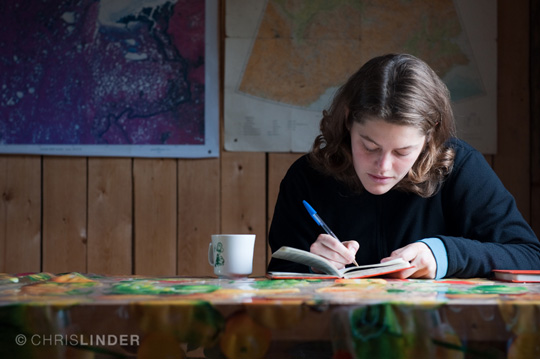Field Notes
During, before, and after the field course, Polaris students and faculty share their thoughts through journal entries.

During, before, and after the field course, Polaris students and faculty share their thoughts through journal entries.

In our first four days of being here, we’ve sampled about 15 sites, spanning streams and rivers all the way from Duvannyi Yar to the tundra. With summer coming to a close, we’ve decided to take advantage of the warm and mosquito-free days that this Siberian autumn has offered us
Continue readingWe experienced this first hand as we exercised (and nearly ran out of) patience in the form of a 100-hour delay in Yakutsk – a new Polaris record!
Continue readingWith three red-eye flights 4 hours in front of me, the GRE 4 hours behind me, and a final pile of fruits and vegetables in front of me, I feel ready to take off for the land of moose meat, confusing weather, big bugs and epic science.
Continue readingAs an environmental scientist who is interested in understanding the global carbon cycle and how humans and our activities are changing it I love my job. Everyday I get to work on interesting questions that have ramifications for everyone on Earth. To answer these questions I travel to field sites
Continue readingWhen Heather Alexander tried to thank the Zimovs for hosting us at the Northeast Science Station, Sergey Zimov reprimanded her saying “We are all family, we do not say ‘thank you’ to family.” Today I leave one family to return to another.…
Continue readingWhen most people look at the ground they probably see lifeless brown material that they call dirt. First, dirt is not the same as soils and they should never be confused as it insults the integrity of soils. Dirt is valueless, unearthed soil.…
Continue readingReflections on moving forward after a whirlwind summer of research and adventure
Continue readingI have a fascination with the interaction of animals and plants. Although the relationship may appear to be as simple as an herbivore eating a plant then digesting it, there are more complex mechanisms at play. Plants use a lot of energy to create leaves, which in turn provides food
Continue readingWell as forecasted, the last few days of Polaris were some hectic ones…but I can happily say…MISSION ACCOMPLISHED!
Continue reading…I knew Polaris 2013 would be something new, but I had no clue what to expect and I don’t think anyone could have predicted what its impacts were going to be…
Continue readingFire in tundra ecosystems is a relatively rare, though not unheard of occurrence. Here, fires burn a combination of vegetation and peat in the soil, releasing tons of carbon into the atmosphere and leading to a deepening of the seasonally thawed active layer, which may release even more carbon into
Continue readingUltimately, we desire to know how carbon changes (fluxes) over time, but prior to this, we need a thorough accounting of the carbon stocks. This accounting is done through the terrestrial survey.
Continue readingSince the arctic is underlain by a layer of permafrost, soil that remains frozen year-round, water does not penetrate far into the ground from the surface. However, the thawed layer of soil is getting deeper every year as a consequence of climate change, referred to as active layer deepening.…
Continue readingHeidi takes a look at the differences between various vegetation types in the Y4 watershed.
Continue readingWhat started as an faint interest in mosses and lichens resulted in a manipulative experiment set in the rolling hills of the Y4 watershed.
Continue reading